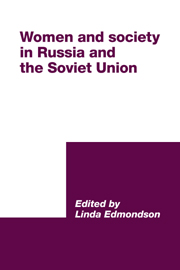Book contents
- Frontmatter
- Contents
- Notes on contributors
- Preface
- Introduction
- 1 ‘Better halves’? Representations of women in Russian urban popular entertainments, 1870-1910
- 2 The Silver Age: highpoint for women?
- 3 Women pharmacists in Russia before World War I: women's emancipation, feminism, professionalization, nationalism and class conflict
- 4 Women's rights, civil rights and the debate over citizenship in the 1905 Revolution
- 5 Laying the foundations of democracy in Russia: E. D. Kuskova's contribution, February–October 1917
- 6 Mariia L. Bochkareva and the Russian amazons of 1917
- 7 Russian women writers: an overview. Post-revolutionary dispersion and adjustment
- 8 Victim or villain? Prostitution in post-revolutionary Russia
- 9 Young women and perestroika
- 10 Glasnost and the woman question
- Index
2 - The Silver Age: highpoint for women?
Published online by Cambridge University Press: 22 October 2009
- Frontmatter
- Contents
- Notes on contributors
- Preface
- Introduction
- 1 ‘Better halves’? Representations of women in Russian urban popular entertainments, 1870-1910
- 2 The Silver Age: highpoint for women?
- 3 Women pharmacists in Russia before World War I: women's emancipation, feminism, professionalization, nationalism and class conflict
- 4 Women's rights, civil rights and the debate over citizenship in the 1905 Revolution
- 5 Laying the foundations of democracy in Russia: E. D. Kuskova's contribution, February–October 1917
- 6 Mariia L. Bochkareva and the Russian amazons of 1917
- 7 Russian women writers: an overview. Post-revolutionary dispersion and adjustment
- 8 Victim or villain? Prostitution in post-revolutionary Russia
- 9 Young women and perestroika
- 10 Glasnost and the woman question
- Index
Summary
The ‘Golden Age’ is a literary historical term used to designate the Pushkin period and the writing of poetry by men. The term ‘Silver Age’ designates the period of modernism, but also refers to the achievement of male poets. However, the Silver Age period was more of a Golden Age for women writers, especially for female lyric poets. In any case, the Silver Age was definitely a period of transition during which women became professionals in all areas of literary activity – in poetry, prose, drama, literary criticism, as well as in the area of popular literature. If at the beginning of the period there were no major female poets, by 1910 there were several. In 1909 Annenskii noted this wealth of female poets as a unique contribution of the modernist movement: ‘Female lyric poetry is one of the achievements of that cultural effort which modernism will bequeath to history’. By the end of the period, there was firmly established a female poetic tradition that has remained a vital stream in modern Russian literature both in the Soviet Union and abroad.
To explain this transition, one must consider aesthetic, historical, philosophical and economic factors. Historically women's status was changing, as Russian society itself was being restructured by the forces of industrialization and urbanization. Economically, a new market for popular commercial fiction gave women writers the possibility of earning a living by writing ‘women's novels’.
- Type
- Chapter
- Information
- Women and Society in Russia and the Soviet Union , pp. 32 - 47Publisher: Cambridge University PressPrint publication year: 1992
- 1
- Cited by



